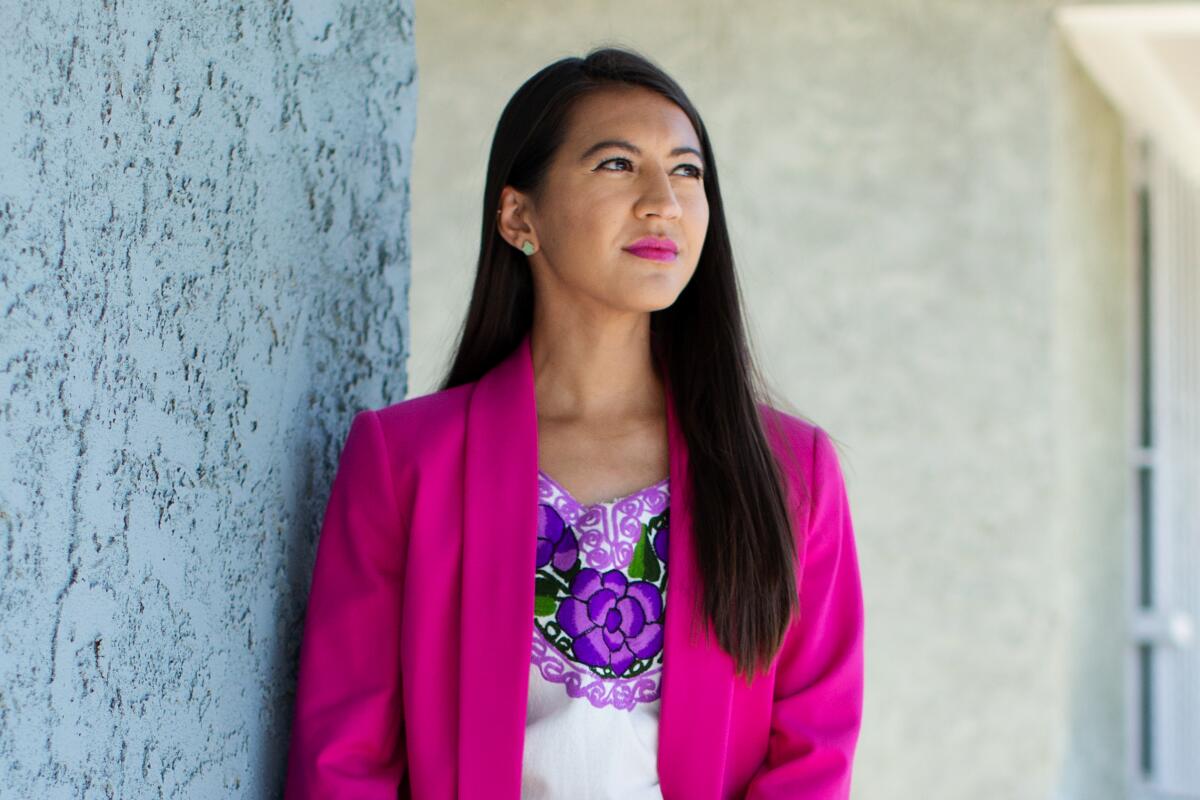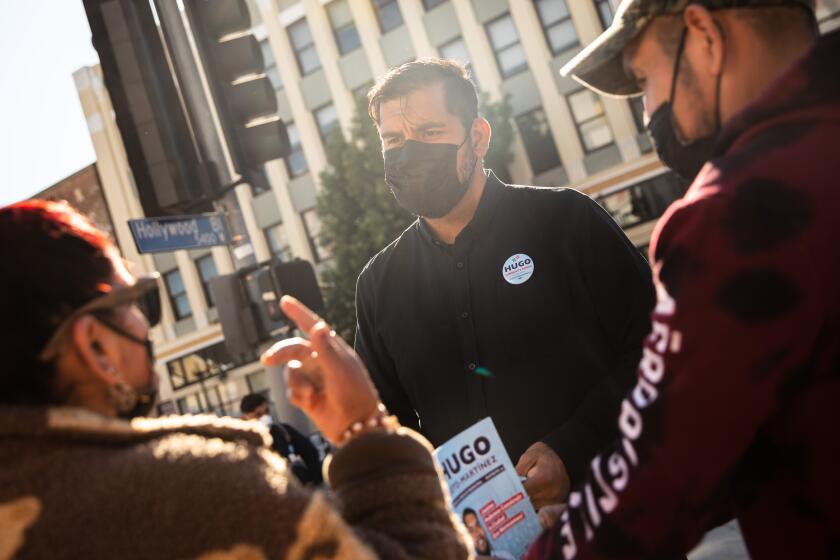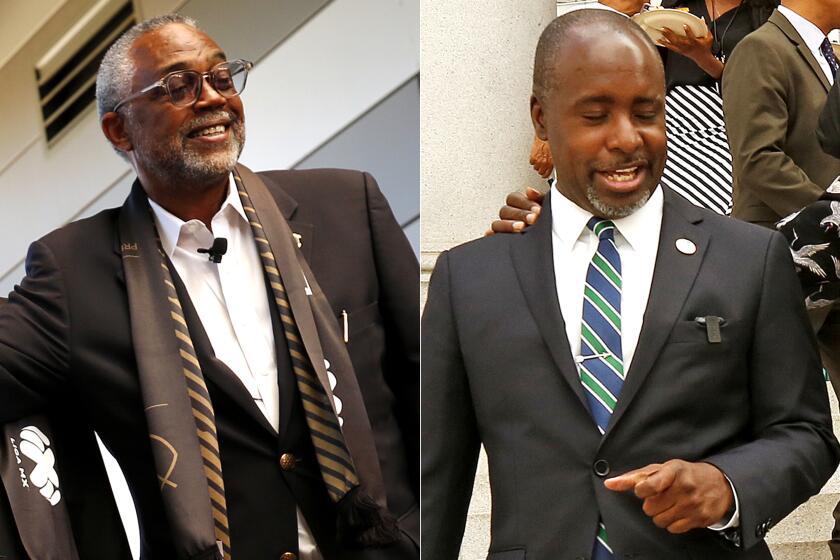Column: Will L.A. City Council get its own ‘Squad’? This young Latina running for District 9 hopes so

In a recent TikTok video, Dulce Vasquez, 36, smirks as she listens to Donald Trump announcing his first presidential campaign: “When Mexico sends its people, they’re not sending their best.”
Vasquez, a formerly undocumented Mexican immigrant running for Los Angeles City Council’s District 9, places a hand on her sweater, featuring a saguaro. “Me?” she mouths as Trump drones on: “They’re not sending you. They’re not sending you.”
Vasquez feigns slapping the ex-president. “Shut the [expletive] up,” she says, as a stream of text shows her achievements over “Por Mi México” by rappers Lefty Sm and Santa Fe Klan.
The video, with about 85,000 views, shows Vasquez’s social media savvy in appealing to millennials and Gen Z. Her campaign has raised more than $211,000, bringing her closer than all other challengers to incumbent City Councilman Curren Price, 71, a longtime elected official who has raised more than $365,000.
Opinion Columnist
Jean Guerrero
Jean Guerrero is the author, most recently, of “Hatemonger: Stephen Miller, Donald Trump and the White Nationalist Agenda.”
The race for District 9, a historic hub of Black culture and political empowerment, embodies complicated issues about representation amid demographic change. It’s now about 80% Latino, with a higher proportion of foreign-born residents than the county. But it hasn’t had a Latino council member in decades.
“This is in a context of a city where the Black political voice has a sense of shrinking,” Manuel Pastor, a sociology professor and co-author of “South Central Dreams,” told me.
The district includes Historic South-Central, USC, parts of the Vermont-Slauson neighborhood and more, stretching from near Interstate 10 on the north to East 95th Street on the south.
Could a young Latina who grew up in Florida and recently made her home in the district better represent its residents, who have the city’s highest poverty and unemployment rates? She pitches herself as more progressive than Price and argues that she “better understands the needs of the community.”
Her background is in education, mentoring students and working for Arizona State University in Los Angeles, most recently as director of strategic partnerships, which Vasquez believes would serve her well in building alliances in the district.
Price, who is Black, has been endorsed by labor groups and has strong relationships with grassroots organizations for immigrants, such as CARECEN, a nonprofit organization serving Central Americans, and CHIRLA, an immigrant rights group, which opened a satellite office within Price’s office.
CHIRLA’s executive director Angelica Salas credits Price with significant investments in financial support for legal aid and other critical resources for mixed-status families. About a third of Latino adults in the district are undocumented.
“He is absolutely the best local leader bar none on this issue,” she told me, referring to his support for immigrants.
Price has led progressive fights such as raising the minimum wage, legalizing street vendors, securing a guaranteed-income pilot program and banning the box on job applications asking about convictions. His staff is heavily Latinx and young. He argues he’s the best candidate because of his extensive experience building multiracial coalitions, his deep roots in the district and his attention to residents.
“I’m probably the most progressive member of the council, Black, brown or otherwise,” he told me.
Los Angeles City Council incumbents could be more vulnerable than they’ve been in the past.
He has received criticism for allowing developments in the district that some believe fuel gentrification and displacement. He counters that they’ve brought jobs and new affordable housing.
Vasquez argues that her campaign represents a long-overdue generational shift. District 9 is younger than the rest of the city. “We’ve seen what ‘the Squad’ has done in Washington,” José Richard Áviles, 31, who grew up in District 9, told me, referring to four women of color elected to Congress in 2018 — Reps. Alexandria Ocasio-Cortez (D-N.Y.), Rashida Tlaib (D-Mich.), Ilhan Omar (D-Minn.) and Ayanna Pressley (D-Mass.). “So what would it look like to have another young city council member along with Nithya [Raman] to have an L.A. squad? That’d be great.”
A native Spanish speaker from Tamaulipas, Vasquez hopes to inspire greater Latinx voter participation, which is relatively low. A new survey commissioned by the Pat Brown Institute and the California Community Foundation found 82% of Latinos believe it’s important for a Latino to represent them in office.
Canvassing the district last Friday, Vasquez met locals who expressed enthusiasm about having a Latina councilwoman. One undocumented woman said she wished she could vote for her. Vasquez thanked her in Spanish: “You can’t vote, but you can tell the sisters-in-law and the godmothers!” The resident replied: “And the grandkids! And great-grandkids! And all the citizens!”
Vasquez came to the U.S. with her mother when she was 7. At 14, she became a citizen thanks to her stepfather, a citizen, after being undocumentedfor a time because of an expired visa. Growing up in Davie, Fla., she helped her mother clean houses.
Councilman Marqueece Harris-Dawson called the council’s decision “a travesty,” saying he intends to keep fighting to move Exposition Park into his South L.A. district.
She worked at a swap meet and bused tables. After graduating from Northwestern University, she moved to L.A. in 2008. She fell in love with the city, worked at Zócalo Public Square, an ASU journalism project, and pursued a master’s in public policy at UCLA.
“Los Angeles is a Mexican city,” she told me. “Seeing my favorite candies from my childhood, seeing the colors and the textures, and the things that I had been missing …. I just felt so at home.”
She moved downtown, once part of District 9. But she didn’t buy a home in the district’s current boundaries until 2020. One of her opponents, Adriana Cabrera, a longtime local activist, says Vasquez hasn’t lived here long enough to represent its residents. She calls Vasquez a “gentrifier,” noting her national fundraising network, which includes donors in real estate and construction companies.
Cabrera says Vasquez has failed to show up at important local events, such as one demanding accountability for last year’s LAPD fireworks detonation that injured locals and damaged homes and businesses. “I’m in the community every day,” Vasquez told me.
She says she plans to prioritize new affordable housing construction and supporting small businesses. She was inspired to run by the election of “the Squad” in Congress. She thought: “That’s what the rest of our elected bodies could look like.”
Vasquez may need to spend more time in the district to earn residents’ trust, but her campaign speaks to a deep longing among Latinos to see more Latino leaders in the halls of power. It’s no wonder she has managed to spark so much excitement.
As Celia Lacayo, a Chicana/o and African American studies professor at UCLA, put it to me: “We need to see more Latino politicians, and they need to be extraordinarily attentive to African American needs, just like African American politicians have been attentive to Latino needs.”
More to Read
A cure for the common opinion
Get thought-provoking perspectives with our weekly newsletter.
You may occasionally receive promotional content from the Los Angeles Times.















